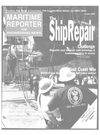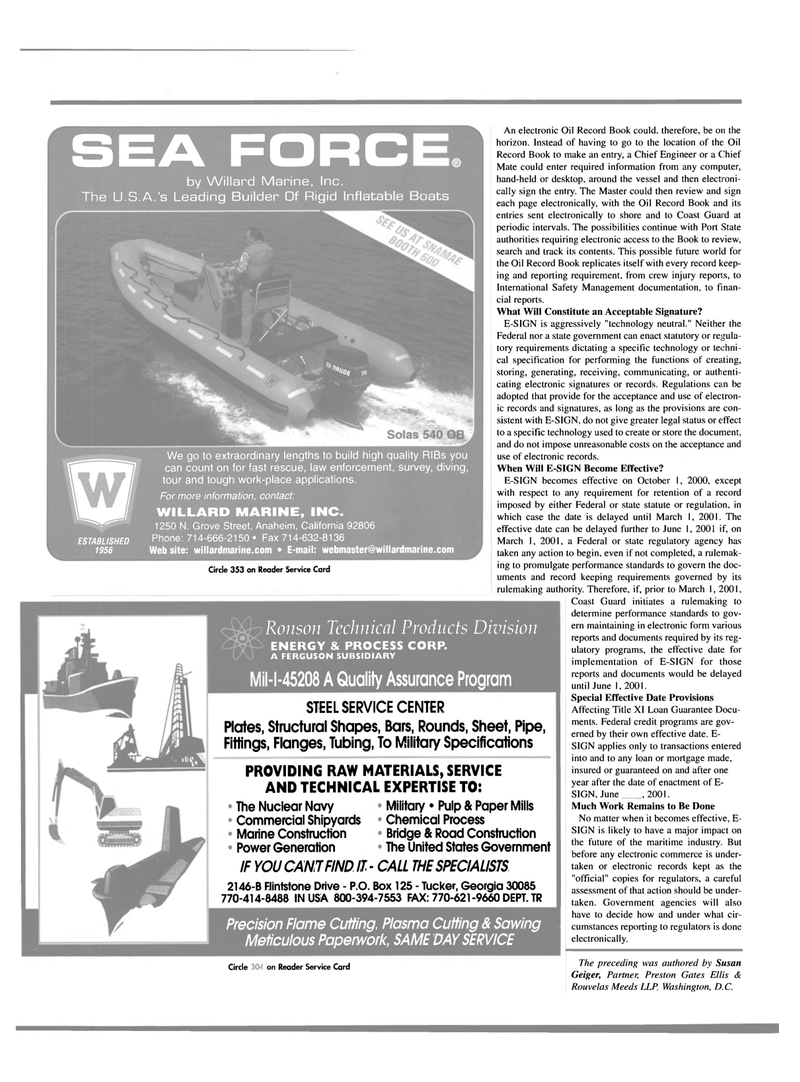
Page 22: of Maritime Reporter Magazine (October 2000)
Read this page in Pdf, Flash or Html5 edition of October 2000 Maritime Reporter Magazine
SEA FDRC by Willard Marine, Inc.
The U.S.A.'s Leading Builder Of Rigid Inflatable Boats \ """Of w
ESTABLISHED 1956
We go to extraordinary lengths to build high quality RIBs you can count on for fast rescue, law enforcement, survey, diving, tour and tough work-place applications.
For more information, contact:
WILLARD MARINE, INC. 1250 N. Grove Street, Anaheim, California 92806
Phone: 714-666-2150 • Fax 714-632-8136
Website: willardmarine.com • E-mail: [email protected]
Circle 353 on Reader Service Card
Ronson Technical Products Division
ENERGY & PROCESS CORP.
A FERGUSON SUBSIDIARY il-l-45208 A Quality Assurance Program
STEEL SERVICE CENTER
Plates, Structural Shapes, Bars, Rounds, Sheet, Pipe,
Fittings, Flanges, Tubing, To Military Specifications
PROVIDING RAW MATERIALS, SERVICE
AND TECHNICAL EXPERTISE TO:
The Nuclear Navy
Commercial Shipyards
Marine Construction
Power Generation
An electronic Oil Record Book could, therefore, be 011 the horizon. Instead of having to go to the location of the Oil
Record Book to make an entry, a Chief Engineer or a Chief
Mate could enter required information from any computer, hand-held or desktop, around the vessel and then electroni- cally sign the entry. The Master could then review and sign each page electronically, with the Oil Record Book and its entries sent electronically to shore and to Coast Guard at periodic intervals. The possibilities continue with Port State authorities requiring electronic access to the Book to review, search and track its contents. This possible future world for the Oil Record Book replicates itself with every record keep- ing and reporting requirement, from crew injury reports, to
International Safety Management documentation, to finan- cial reports.
What Will Constitute an Acceptable Signature?
E-SIGN is aggressively "technology neutral." Neither the
Federal nor a state government can enact statutory or regula- tory requirements dictating a specific technology or techni- cal specification for performing the functions of creating, storing, generating, receiving, communicating, or authenti- cating electronic signatures or records. Regulations can be adopted that provide for the acceptance and use of electron- ic records and signatures, as long as the provisions are con- sistent with E-SIGN, do not give greater legal status or effect to a specific technology used to create or store the document, and do not impose unreasonable costs on the acceptance and use of electronic records.
When Will E-SIGN Become Effective?
E-SIGN becomes effective on October 1, 2000, except with respect to any requirement for retention of a record imposed by either Federal or state statute or regulation, in which case the date is delayed until March 1, 2001. The effective date can be delayed further to June 1, 2001 if, on
March I, 2001, a Federal or state regulatory agency has taken any action to begin, even if not completed, a rulemak- ing to promulgate performance standards to govern the doc- uments and record keeping requirements governed by its rulemaking authority. Therefore, if, prior to March 1, 2001,
Coast Guard initiates a rulemaking to determine performance standards to gov- ern maintaining in electronic form various reports and documents required by its reg- ulatory programs, the effective date for implementation of E-SIGN for those reports and documents would be delayed until June 1, 2001.
Special Effective Date Provisions
Affecting Title XI Loan Guarantee Docu- ments. Federal credit programs are gov- erned by their own effective date. E-
SIGN applies only to transactions entered into and to any loan or mortgage made, insured or guaranteed on and after one year after the date of enactment of E-
SIGN, June , 2001.
Military • Pulp & Paper Mills
Chemical Process
Bridge & Road Construction
The United States Government
IF YOU CAN7 FIND IT - CALL THE SPECIALISTS 2146-B Flintstone Drive - P.O. Box 125 - Tucker, Georgia 30085 770-414-8488 IN USA 800-394-7553 FAX: 770-621-9660 DEPT. TR
Precision Flame Cutting, Plasma Cutting & Sawing
Meticulous Paperwork, SAME DAY SERVICE 24 Circle 218 on Reader Service Card
Much Work Remains to Be Done
No matter when it becomes effective, E-
SIGN is likely to have a major impact on the future of the maritime industry. But before any electronic commerce is under- taken or electronic records kept as the "official" copies for regulators, a careful assessment of that action should be under- taken. Government agencies will also have to decide how and under what cir- cumstances reporting to regulators is done electronically.
The preceding was authored by Susan
Geiger, Partner, Preston Gates Ellis &
Rouvelas Meeds LLP, Washington, D.C.

 21
21

 23
23
